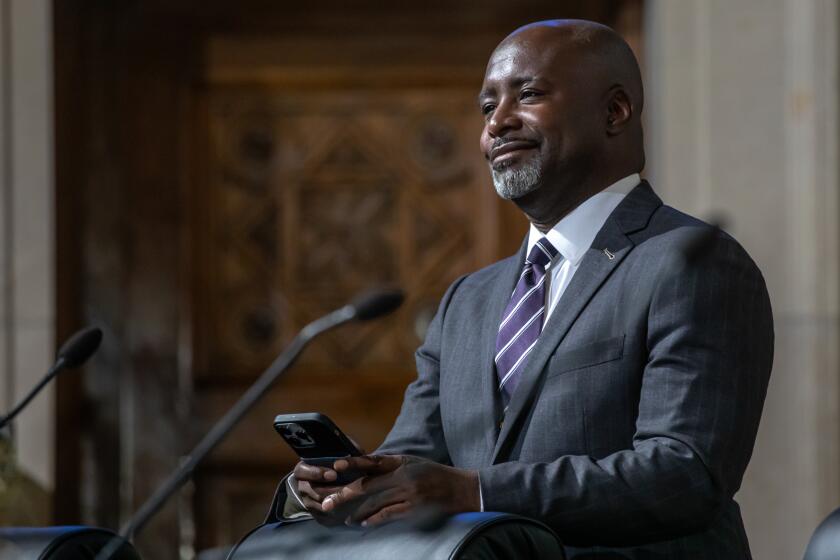Holding on in Compton
- Share via
For decades, African Americans have dominated Compton’s power structure and held most of the elected offices. Every member of the City Council is black, as is the mayor, the clerk, the treasurer and the city attorney.
So when I was assigned to report stories in Compton each week for my USC journalism class last semester, I expected to find a predominantly African American city. My initial research, on the city’s official website, didn’t challenge that assumption. I found images of African American council members out in the black community, determined to change their city’s image. They even had a slogan: “Birthing a New Compton.”
Once I began spending time in the city, I did find a new Compton, but not the one the website suggested. Because, although the city’s power structure remains overwhelmingly African American, the city itself is now nearly two-thirds Latino.
Diana Sanchez, a lifelong Compton resident, ran for City Council in the April election in part because she believed that Latinos in Compton were ready for a council member who looked like them.
“In the past, [Latinos] did not feel that their vote counted,” she said during the campaign. “But I think things have honestly changed. The political movements in our national government have opened their eyes that their vote does count.”
Incumbent Yvonne Arceneaux, who was running for her fifth term on the council, dismissed the idea that race should matter in the election, saying that her service is “colorblind” and addresses the needs of both the black and Latino communities.
Sanchez knew it would be an uphill battle. Compton’s election is “at large,” meaning all residents of the city vote for all candidates, rather than each neighborhood electing its own council member. This method tends to dilute the voting strength of underrepresented voters. Moreover, Arceneaux’s campaign raised four times more money.
Sanchez lost the election. And indeed, when the ballots were counted, every race in April’s election went to an African American.
Numbers tell part of the story. About 40% of Latinos in Compton are under 18, and 32% are noncitizens. But many Compton Latinos blame the city’s election procedures.
At-large voting rules have come under fire in recent months in school district elections across California. In a lawsuit brought in Madera, where the overwhelmingly Latino population was severely underrepresented on the school board, a judge issued an injunction last year against the city holding at-large elections, saying they violated the California Voting Rights Act by promoting “racially polarized voting.” In the wake of that finding, school boards and city councils across the state have switched to district elections.
Pedro Pallan, who lost a bid for Compton City Council in 1991, hopes that Compton too will move to bring Latinos into the political fold. “We’re disenfranchised at the moment,” he told me.
Understandably, blacks in Compton are reluctant to surrender their hold on the city. “The Latinos, they have Lynwood, Paramount, Huntington Park, Maywood,” Royce Esters, president of the National Assn. for Equal Justice in America, a Compton-based civil rights organization, told me. “They have all those little cities just north of Compton. Blacks [in Compton] aren’t going to give up as quickly for something we worked so hard for. I don’t think they’re going to give up their power over here at all.”
That may be, but Pallan told me that Latinos will not be satisfied until they have a chance to demonstrate their cross-cultural skills in city government alongside their African American neighbors. “They say they’re colorblind, but all they see through their eyes is African Americans in City Hall,” Pallan said. “That’s the only color there.”
Eventually, no matter what the city’s power elite does to hang on, the numbers will prevail. Nearly 70% of all Compton residents under the age of 18 who are U.S. citizens are Latino. When they become old enough to vote, Latino candidates for City Council will inevitably begin winning city elections -- even at-large elections.
More to Read
Sign up for Essential California
The most important California stories and recommendations in your inbox every morning.
You may occasionally receive promotional content from the Los Angeles Times.










